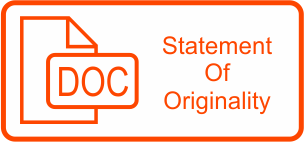Effectiveness of Electronic Court System (E-Court) in Kuningan Religious Court Based on PERMA Number 7 of 2022
(1) Universitas Kuningan
(2)
(*) Corresponding Author
Abstract
The Kuningan Religious Court, as part of the national justice system, also implements E-Court based on applicable regulations, including PERMA Number 7 of 2022. This study aims to evaluate the impact of E-Court implementation on case resolution time and litigation costs at the Kuningan Religious Court. The research method used by the author is empirical juridical, where this research is descriptive and tends to use analysis and theory as a guideline so that the study focuses on facts in the field. The findings are to develop more measurable and specific effectiveness indicators that are relevant to the context of the Kuningan Religious Court and PERMA Number 7 of 2022. For example, not only measuring the general case resolution time but also measuring the impact of E-Court on specific stages regulated in the new PERMA. With the implementation of PERMA Number 7 of 2022, the Kuningan Religious Court has contributed to the realization of the principles of fast, simple, and low-cost justice. The conclusion obtained is that E-Court at the Kuningan Religious Court is systematically starting from online registration (E-Filling), online payment (E-Payment), online summons of parties (E-Summon), and electronic trials (E-Litigation) has been effective. There are several supporting and inhibiting factors in the Implementation of E-Court, namely in terms of supporting factors are Human Resources (HR) and Adequate Facilities and Facilities, Reducing Litigation Costs and Good Internet Networks while inhibiting factors Constrained Calls and e-court System Network Error.
Keywords
Full Text:
PDFReferences
Akhyar, Sayed. “Efektivitas Pelaksanaan Asas Peradilan Sederhana, Cepat Dan Biaya Ringan Berkaitan Dengan Yurisdiksi Pengadilan Negeri Sigli.” Syiah Kuala Law Journal 3, no. 3 (2019): 380–94. https://doi.org/10.24815/sklj.v3i3.12583.
Asnawi. “Efektvitas Penyelenggaran Publik” 1 (2016).
Berutu, Lisfer. “Mewujudkan Peradilan Sederhana, Cepat Dan Biaya Ringan Dengan e-Court.” Jurnal Ilmiah Dunia Hukum 5, no. 1 (2020): 41–53. https://doi.org/http://dx.doi.org/10.56444/jidh.v5i1.1552.
Fae, Gracia, Majolica Ocarina, and Ronaldo Sanjaya. “Eksistensi E-Court Untuk Mewujudkan Efisiensi Dan Efektivitas Pada Sistem Peradilan Indonesia Di Tengah Covid-19.” Jurnal Syntax Transformation 2, no. 04 (2021): 496–507. https://doi.org/10.46799/jst.v2i4.253.
Hanitiyo, Ronny Soemitro. Metodologi Penelitian Hukum. Bandung: Ghalia Indonesia, 1982.
Hidayat, Fahmi Putra. “Efektifitas Penerapan E-Court Dalam Penyelesaian Perkara Di Pengadilan Agama Makassar.” UIN Alaudin Makassar, 2020.
Lutfia, Vivi. “Optimalisasi Penegakan Hukum Terhadap Penyelenggaraan Peradilan Melalui E-Court Dalam Mewujudkan Keadilan Bagi Masyarakat Di Era Digitalisasi.” Jurnal Lex Renaissance 6, no. 4 (2021): 677–91. https://doi.org/10.20885/jlr.vol6.iss4.art3.
Pebrianto, Roni, and Zainal Azwar, Ikhwan. “Efektifitas Penerapan E-Court Dalam Penyelesaian Perkara (Studi Kasus Di Pengadilan Agama Painan).” Jurnal AL-AHKAM 22, no. 1 (2021): 181–97.
Republik Indonesia, Mahkamah Agung. Buku Panduan E-Court. Jakarta: Mahkamah Agung Republik Indonesia, 2019.
———. Peraturan Mahkamah Agung Nompr 7 Tahun 2022 tentang Perubahan Atas Peraturan Mahkamah Agung Nomor 1 Tahun 2019 tentang Administrasi Perkara dan Persidangan di Pengadilan secara Elektronik. (2022).
Retnaningsih, Sonyendah, Disriani Latifah Soroinda Nasution, Rouli Anita Velentina, and Kelly Manthovani. “Pelaksanaan E-Court Menurut Perma Nomor 3 Tahun 2018 Tentang Administrasi Perkara Di Pengadilan Secara Elektronik Dan E-Litigation Menurut Perma Nomor 1 Tahun 2019 Tentang Administrasi Perkara Dan Persidangan Di Pengadilan Secara Elektronik (Studi Di Peng.” Jurnal Hukum & Pembangunan 50, no. 1 (2020): 124–44. https://doi.org/10.21143/jhp.vol50.no1.2486.
Saryono, Hanadi. Metodologi Penulisan Dan Penelitian Hukum. Purwokerto: Universitas Jenderal Soedirman, 2008.
Saudi, Amran. Pembaruan Hukum Acara Perdata Di Indonesia, Menakar Beracara Di Pengadilan Secara Elektronik. Jakarta: Prenadamedia Group, 2019.
Shodikin, Akhmad, Asep Saepullah, and Imas Indah Lestari. “Efektivitas Penerapan Sistem E-Court Pengadilan Agama Dalam Perkara Perceraian.” Jurnal Mediasas : Media Ilmu Syari’ah Dan Ahwal Al-Syakhsiyyah 4, no. 2 (2021): 135. https://jurnal.kopertais5aceh.or.id/index.php/mediasas/article/view/290.
Soekanto, Soerjono. Faktor-Faktor Yang Mempengaruhi Penegakan Hukum. Jakarta: Raja Grafindo Persada, 2010.
———. Pengantar Penelitian Hukum. Jakarta: Universitas Indonesia Press, 1986.
DOI: 10.24235/inklusif.v10i1.20079
Article Metrics
Abstract view : 8 timesPDF - 2 times
Refbacks
- There are currently no refbacks.
 |  |  |  |  |
 |  |  |  |
|












.png)